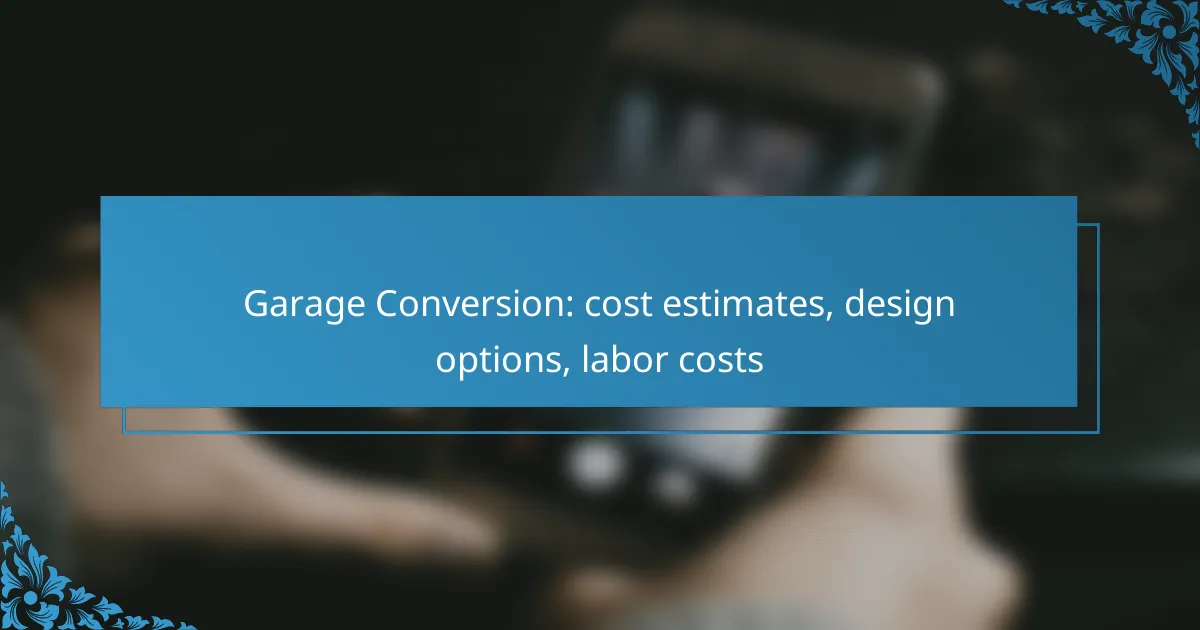Converting a garage can be a valuable investment for homeowners, with costs in Toronto typically ranging from CAD 20,000 to CAD 60,000 based on design complexity and materials. There are numerous design options available, allowing for a customized space that enhances both functionality and property value. Labor costs in Ontario can vary, generally falling between CAD 50 and CAD 150 per hour, depending on the contractor’s expertise and the project’s intricacy.
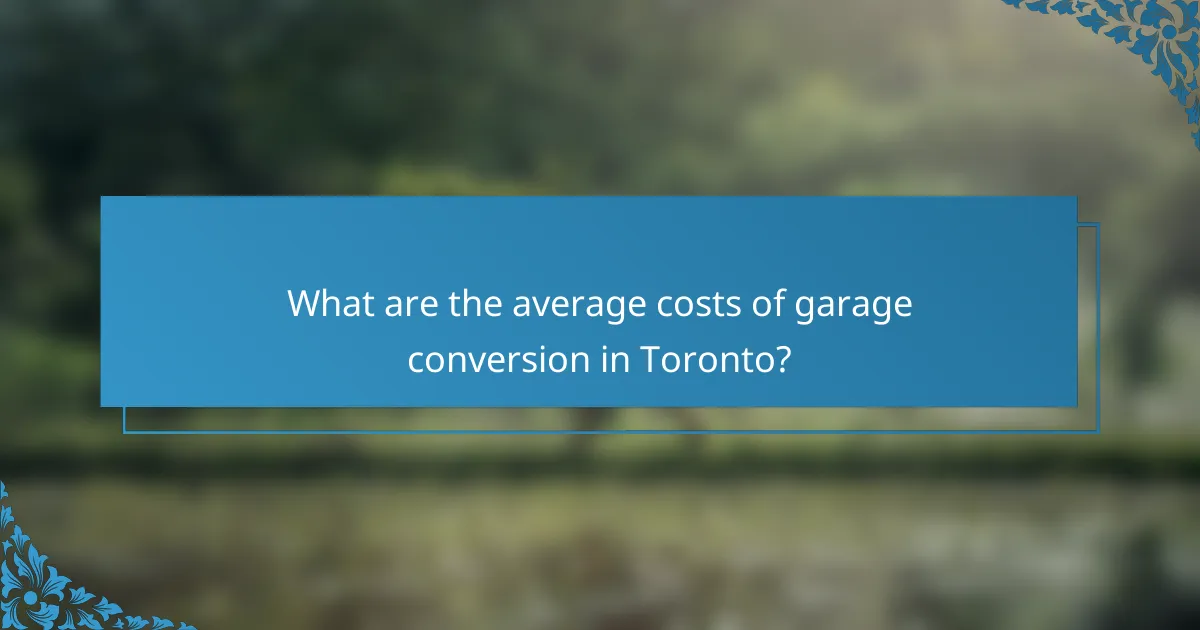
What are the average costs of garage conversion in Toronto?
The average costs of garage conversion in Toronto typically range from CAD 20,000 to CAD 60,000, depending on various factors such as design complexity and materials used. Homeowners should consider their specific needs and budget when planning a conversion project.
Cost range for basic conversions
Basic garage conversions in Toronto usually cost between CAD 20,000 and CAD 30,000. This price range generally covers essential renovations like insulation, flooring, and basic electrical work, transforming the space into a functional room.
For a straightforward conversion, homeowners can expect to spend on standard finishes and minimal structural changes. It’s advisable to obtain multiple quotes from contractors to ensure competitive pricing.
Cost range for high-end conversions
High-end garage conversions can range from CAD 40,000 to CAD 60,000 or more. This includes premium materials, advanced design features, and extensive renovations, such as adding bathrooms or kitchens.
Investing in high-quality finishes and custom designs can significantly enhance the space’s appeal and functionality. Homeowners should weigh the benefits of these upgrades against their overall budget and long-term plans.
Factors influencing cost
Additionally, labor costs can vary based on contractor experience and the complexity of the project. It’s crucial to consider these elements when estimating the total investment for a garage conversion.
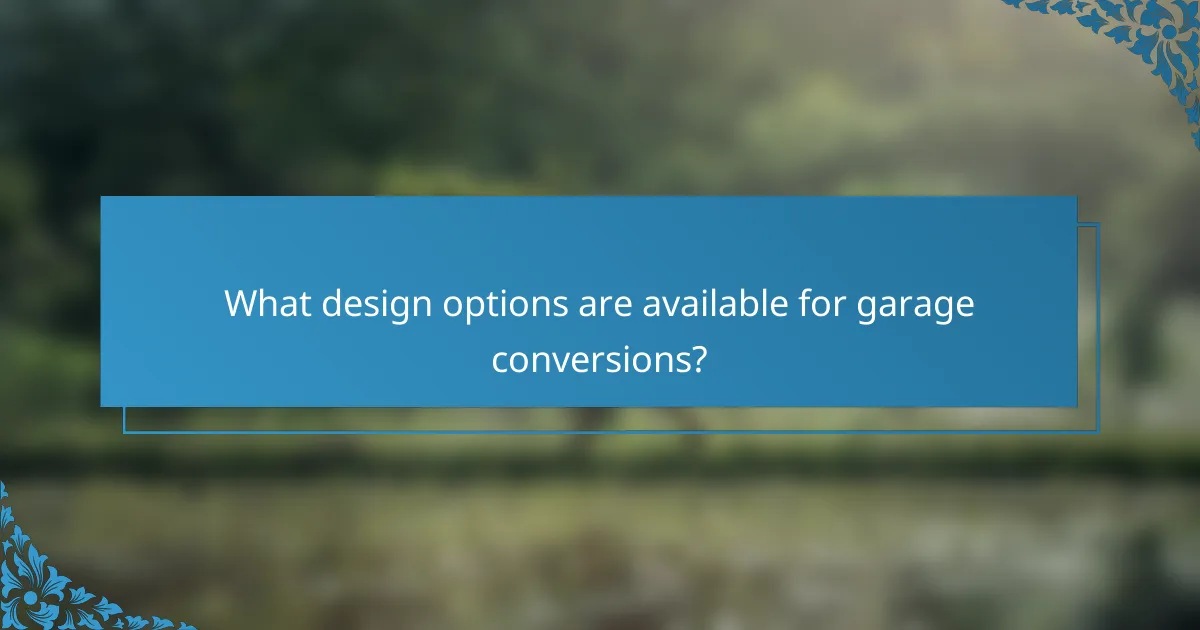
What design options are available for garage conversions?
Garage conversions offer a variety of design options to maximize space and functionality. Homeowners can choose from different styles and layouts to create a living area that meets their needs while enhancing the property’s value.
Popular design styles
Common design styles for garage conversions include contemporary, rustic, and minimalist. A contemporary style often features clean lines, large windows, and open spaces, making the area feel larger and more inviting. Rustic designs may incorporate natural materials like wood and stone, creating a cozy, warm atmosphere.
Minimalist designs focus on simplicity and functionality, using neutral colors and uncluttered spaces to promote a sense of calm. Each style can be tailored to fit personal tastes while ensuring the conversion blends seamlessly with the existing home.
Functional layouts
When planning a garage conversion, consider functional layouts that maximize usability. Popular options include creating a home office, guest suite, or recreational area. Each layout should prioritize natural light and accessibility to enhance the overall experience.
Incorporating built-in storage solutions can help maintain organization and reduce clutter. For example, using wall-mounted shelves or multi-functional furniture can optimize space without sacrificing style.
Design considerations for small spaces
In small garage conversions, every inch counts. Opt for open floor plans that eliminate unnecessary walls, creating a more spacious feel. Using lighter colors for walls and furnishings can also help to visually expand the area.
Consider multi-purpose furniture, such as a sofa bed or foldable tables, to maximize functionality without overwhelming the space. Additionally, strategically placed mirrors can enhance light and create an illusion of depth, making the area feel larger.
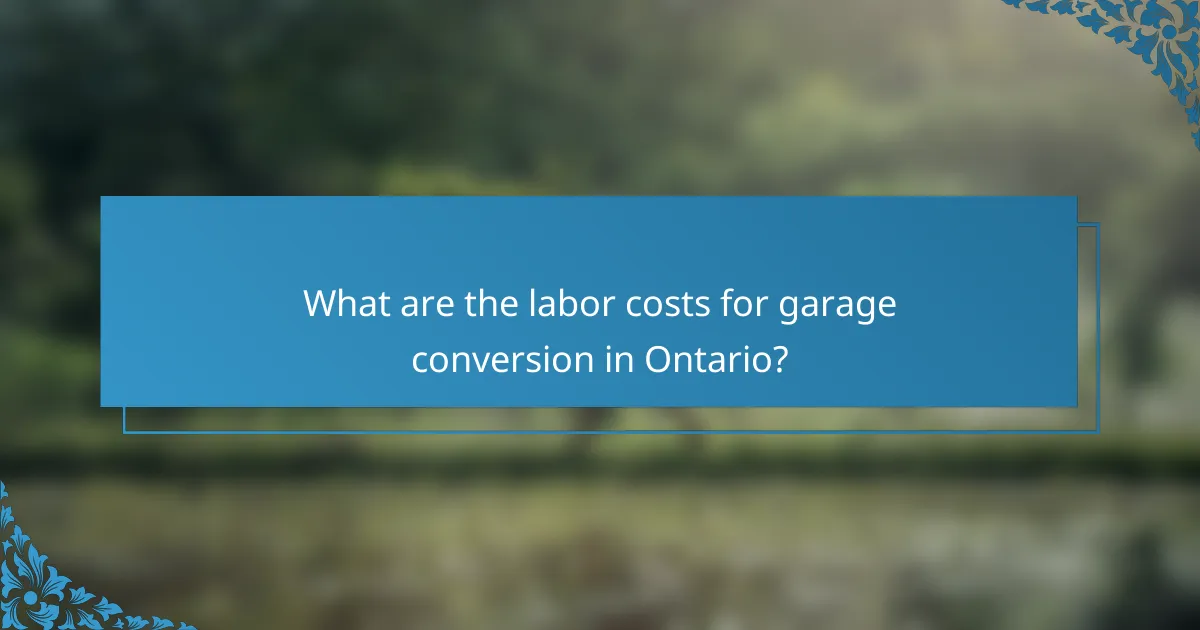
What are the labor costs for garage conversion in Ontario?
The labor costs for garage conversion in Ontario can vary significantly based on the complexity of the project and the type of professionals hired. Generally, homeowners should expect to pay between CAD 50 and CAD 150 per hour for labor, depending on the contractor’s experience and specialization.
Average hourly rates for contractors
In Ontario, the average hourly rates for general contractors involved in garage conversions typically range from CAD 60 to CAD 100. This rate can fluctuate based on the contractor’s reputation, location, and the specific services they provide. It’s advisable to obtain multiple quotes to ensure competitive pricing.
For more specialized tasks, such as electrical or plumbing work, rates may be higher. Always verify the contractor’s credentials and check for reviews to ensure quality work.
Cost of specialized labor
Specialized labor for garage conversions, such as electricians and plumbers, usually commands higher rates, often between CAD 80 and CAD 150 per hour. These professionals are essential for ensuring that the conversion meets local building codes and safety standards.
When planning your budget, consider that hiring specialized labor may increase overall costs, but it can also enhance the quality and safety of the conversion. It’s wise to factor in these costs early in the planning process to avoid surprises later on.
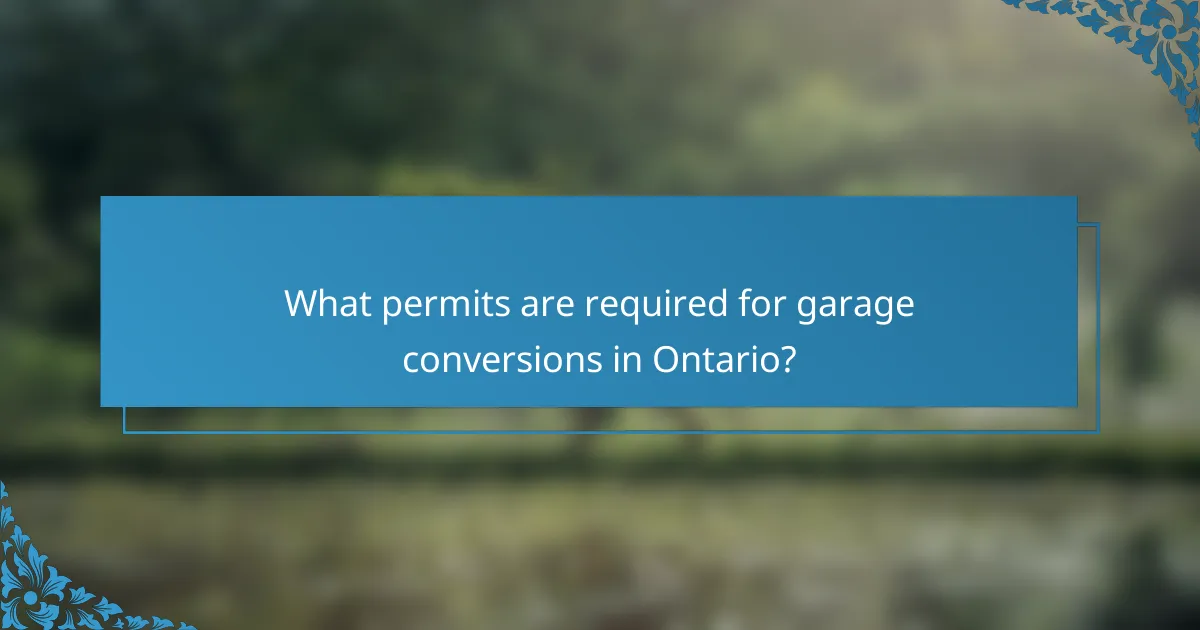
What permits are required for garage conversions in Ontario?
In Ontario, garage conversions typically require a building permit to ensure compliance with local zoning bylaws and safety regulations. Homeowners must also check if additional permits, such as electrical or plumbing permits, are necessary based on the planned modifications.
Types of permits needed
The primary permit required for a garage conversion in Ontario is the building permit, which verifies that the project meets structural and safety standards. Depending on the scope of the conversion, you may also need electrical permits for any wiring changes and plumbing permits if you are adding a bathroom or kitchen area.
Some municipalities may have specific requirements or additional permits, such as zoning permits, especially if the conversion alters the property’s use or exterior appearance. Always consult your local building department for detailed requirements.
Application process overview
The application process for obtaining the necessary permits typically begins with submitting a detailed plan of the proposed garage conversion to your local municipality. This plan should include architectural drawings, site plans, and any additional documentation required by the building department.
After submission, the municipality will review your application to ensure compliance with zoning bylaws and building codes. This process can take several weeks, so it’s advisable to apply well in advance of your planned construction start date. Be prepared for possible revisions to your plans based on feedback from the building department.
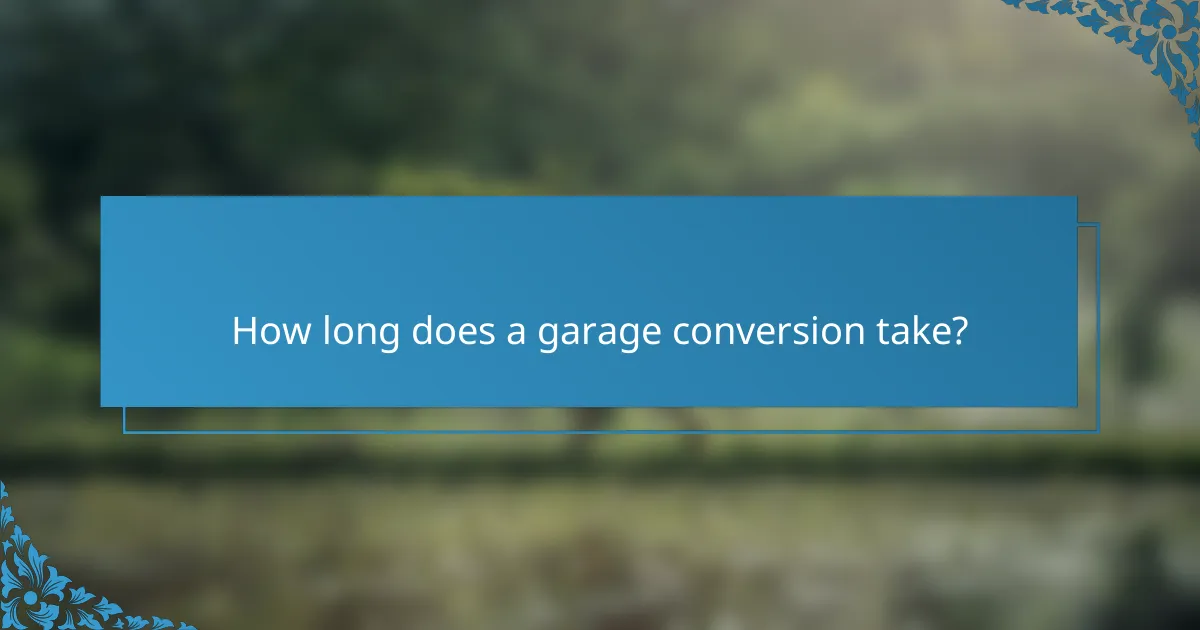
How long does a garage conversion take?
A garage conversion typically takes between 4 to 12 weeks, depending on various factors such as the complexity of the design and local regulations. This timeframe includes planning, construction, and finishing stages.
Typical project timelines
The duration of a garage conversion can vary widely. A simple conversion, such as transforming the space into a basic living area, might take around 4 to 6 weeks. More complex projects, which involve significant structural changes or additional features like plumbing and electrical work, can extend the timeline to 8 to 12 weeks or longer.
It’s essential to account for time spent on obtaining necessary permits and inspections, which can add several weeks to the overall project duration. Planning ahead can help streamline this process.
Factors affecting duration
Additionally, local building codes and regulations may necessitate specific inspections or approvals, which can delay progress. Engaging with a knowledgeable contractor familiar with local requirements can help mitigate these delays and keep the project on track.

What are the benefits of converting a garage?
Converting a garage can provide additional living space, enhance property value, and offer versatile design options. Homeowners often find that a well-planned garage conversion meets their needs while maximizing the utility of their property.
Increased property value
Converting a garage typically increases the overall value of a home. Real estate experts suggest that such conversions can add a significant percentage to the property’s market value, often in the range of 10-20%. This enhancement is particularly appealing in urban areas where living space is at a premium.
When considering a garage conversion, it’s essential to ensure that the design aligns with local architectural styles and neighborhood standards. A well-executed conversion can attract potential buyers and set your property apart in a competitive market.
To maximize property value, focus on high-quality finishes and functional layouts. Consider adding features like natural light sources, energy-efficient insulation, and modern amenities, which can further enhance appeal and justify a higher asking price.
